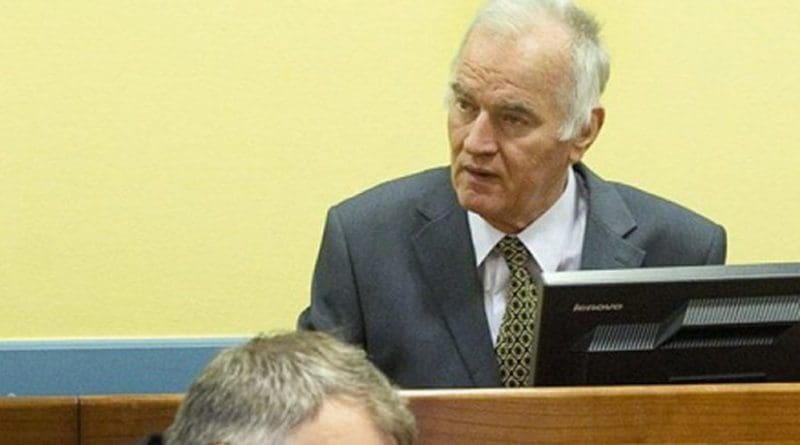Ratko Mladic Awaits Genocide Verdict In The Hague
By Erna Mackic
The Hague Tribunal will deliver one of its most anticipated judgments on Wednesday – the verdict in the trial of the commander of the Bosnian Serb Army’s main headquarters, Ratko Mladic.
The International Criminal Tribunal for the Former Yugoslavia in The Hague on Wednesday will hand down its first-instance verdict after the four-year trial of wartime Bosnian Serb military chief Ratko Mladic, now aged 74, who was one of the world’s most wanted fugitives before being captured and now faces judgment for some of the worst atrocities in Europe since World War II.
Mladic is charged with genocide in Srebrenica in 1995, genocide in six other Bosnian municipalities in 1992, the persecution of Bosniaks and Croats throughout Bosnia and Herzegovina, terrorising the population of Sarajevo with a campaign of shelling and sniping, as well as taking UN personnel hostage.
He was arrested in 2011 after having been on the run for more than 15 years. Around 300 witnesses have been examined during his trial, while around 10,000 pieces of evidence have admitted to the UN court in The Hague.
Some 150 representatives of war victims from Bosnia have already in The Hague arrived a day ahead of the verdict.
Mladic’s son and some Bosnian Serb officials are also expected to attend, but they will be in a separate area, BIRN has learned.
War victims expressed hope of a conviction on all counts.
“As a trauma survivor, I think, whatever the sentence is, it will be too short and not sufficient for all those who he has harmed,” Lejla Deljanin, a Sarajevo resident who was seriously wounded in her head with a sniper bullet in 1992, when she was 11 years old, told BIRN.
But Darko Mladic, the son of the former Bosnian Serb Army commander, said that his father was not guilty of the crimes with which he is charged.
“Any verdict that is not an acquittal would be unacceptable for his family,” Darko Mladic told BIRN.
“All legal analyses show that the Hague prosecution did not prove the indictment which charges my father,” he said.
Darko Mladic, who lives in Belgrade, insisted that “if normal criminal law is applied, General Mladic will be on his way home on November 23”.
Bosnian Serb President Milorad Dodik, who testified for the defence in the trial, said on Tuesday that Mladic “professionally and patriotically” commanded the Bosnian Serb Army which “defended the freedom of the Serb people and created Republika Srpska” during the war.
“No matter what, Mladic remains a legend among the Serb people,” added Dodik.
He claimed that a guilty verdict would only “strengthen the myth of Mladic”.
Ratko Mladic’s lawyer Dragan Ivetic said on Monday meanwhile that the accused Bosnian Serb general may not attend his verdict on November 22 due to poor health.
“A doctor has said [that] any form of stress, including a trial proceeding, may increase [Mladic’s] chance of having a stroke, a heart attack or die,” Ivetic said, Associated Press reported.
Mladic’s defence lawyers asked again earlier this month for the Hague Tribunal to postpone the first-instance verdict on November 22 until it was determined whether the former Bosnian Serb military chief was mentally and physically capable of participating in his trial.
Prior to his arrest in 2011, Mladic had suffered three strokes.
The defence requested in March that Mladic be granted temporary release and allowed to go to Russia for treatment, claiming that the treatment of his illness in UN court’s detention centre had been inadequate.
The court rejected the request, saying that Mladic had received proper treatment in The Hague.
Serbian police arrested Mladic in the village of Lazarevo in Serbia on May 26, 2011.
He was extradited to The Hague immediately and his trial began a year later.
Wednesday’s first-instance verdict can be appealed.

